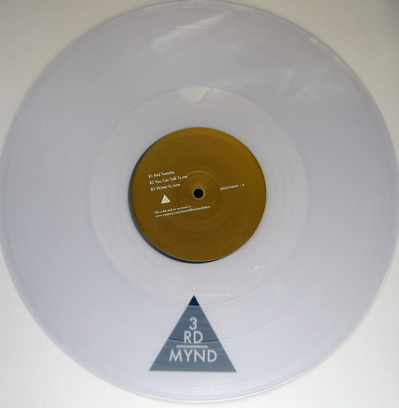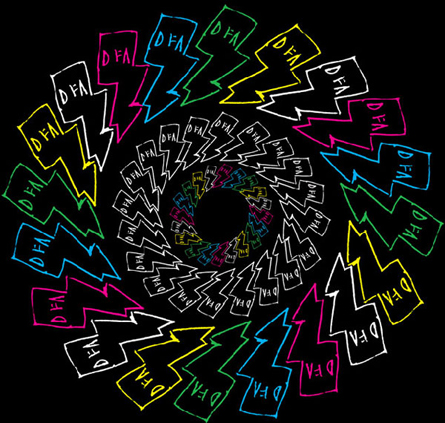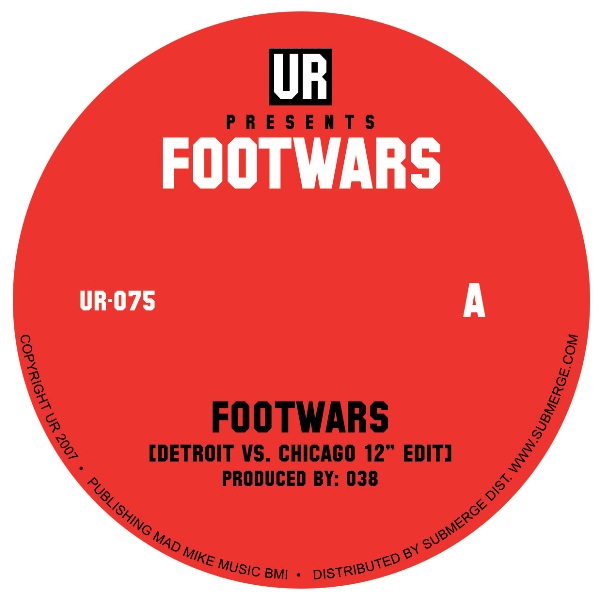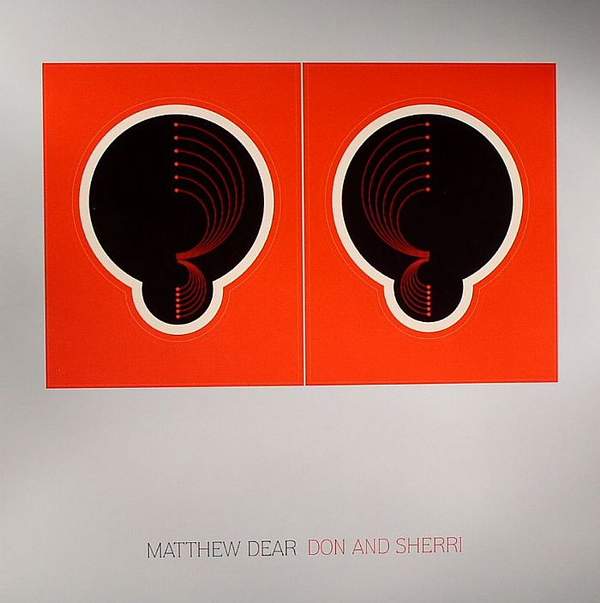
Beyond the Wizard's Sleeve, "West"
3rd Mynd
Although their name alternately suggests a Tolkien-inspired progressive rock group, or a tasteless pussy joke, Beyond the Wizard's Sleeve is actually an audacious musical hybrid that is much more tasteful than either of these two possible meanings would seem to indicate. BTWS is DJ/producer Erol Alkan working with Richard Norris, the experimental dance producer who was one-half of The Grid, and part of Psychic TV during the Jack the Tab years. Together, these two have birthed an entirely new genre, carefully editing and looping old psychedelic pop, mod and garage records from the 1960s into hypnotic, blissed out dancefloor anthems. In this, the Age of Recycled Culture, the idea of turning old freakbeat and krautrock records into repetitive, open-ended, mixable dance jams is one whose time has come. The rapturous hedonism created by these heady mixes is indescribable: a strange mixture of borrowed nostalgia and thrilling novelty. Dance music has always been psychedelic, and by literalizing the connection between 60s psychedelia and 00s club culture, Alkan and Norris outdo PTV at their own game. BTWS have been DJing parties for the past couple years, spinning sets that contain nary a track from the DFA or Ed Banger. Instead, you might hear an extended remix of The Rolling Stones' "2000 Light Years From Home," fading into a hallucinogenic reworking of The Hollies' "King Midas In Reverse," rubbing shoulders with a perversely retooled version of The Monkees' "Can You Dig It?" Because their music relies so heavily on old records—for which there can be no doubt that they have not received copyright clearance—their 12" EPs are released on the fly-by-night label 3rd Mynd, quickly going of print. This newest release contains six tracks of lysergic weirdness to make clubbers of all levels of intoxication see trails. The intro "Space" is a tape-delayed loop of William Shatner's opening monologue from the original Star Trek series, a deliciously campy way to kick things off. Things get further out with "Get Ready to Fly," which has an awesome swirling horn loop and typically starry-eyed vocals: "Get ready to fly/We'll see silver birds in the sky." On the b-side, "You Can Talk To Me" is a re-edit of The Beatles' "Hey Bulldog," emphasizing the jaunty rhythm section, looping John Lennon's vocals to raucous, anthemic effect. Free love, free acid and nouveau riche Euro club trash: this is the kind of party I want to be invited to.
sample:
 Hercules & Love Affair, "Blind"
Hercules & Love Affair, "Blind"
DFA
Hercules & Love Affair are a new signing to the DFA imprint, the work of Andy Butler, a house music classicist through and through. His previous 12" for DFA ("Classique #2") was a superlative exercise in purism: velvety basslines, crisp drum programming, and an atmospheric vocal refrain in the classic diva mold. The b-side ("Roar") was in the same vein, but a bit more maximalist, hard-hitting, and enlivened with a slight but unmistakable vocal contribution from one Antony Hegarty, queer troubador and perhaps the most sought-after guest vocalist after T-Pain. This new single is a teaser for the upcoming full-length album, containing three versions of "Blind," a song that dispenses with much of the house-style synthesis of "Classique #2" in order to go full-tilt disco. Butler approaches this sophisticated, downtown disco with the same determined purism that he approached house music with, creating a sparkling concoction of congos, handclaps, organic bass, shimmering synth arpeggiations, horn fanfares and a full vocal contribution from Antony. The lyrics have all the melodrama of a classic Sylvester side, with perhaps a bit more gay pathos: "As a child I knew, that the stars would only get brighter/And we would get closer/Leaving this darkness behind." The track is fabulously well-produced and unashamedly over-the-top. This CD single contains the album version of the track, an extended club mix that emphasizes the kicks and synth-lines, and an instrumental version. All this bodes very well for Butler's upcoming full-length, which has the potential to be one of the best albums released for DFA after a run of recent lackluster efforts from the likes of LCD Soundsystem, Black Dice and the Shocking Pinks. Hercules & Love Affair is the perfect addition to the DFA stable.
sample:
 Underground Resistance, "Footwars"
Underground Resistance, "Footwars"
UR
The recent music issued from the UR camp has focused on organic, seemingly live percussion (no plasticated 909 thumps) forming the backbone for cannily constructed, uptempo tracks that finally stick their head out of the deep, dark subterranean hole in which the UR collective has been firmly ensconced for years. There's nothing subaquatic, scratchy or vague sounding about the main attraction on this recently issued 12", called "Detroit vs. Chicago." The song is all energy and bounce, almost lighthearted when compared to classic UR missives, which literalized the post-industrial wasteland of Detroit in audio form. Perhaps this is because the battle metaphor being employed here calls for something more extroverted and confrontational, rather than cerebral and withdrawn. Either way, this is a fucking ridiculously great slab of vinyl, pitting two long-standing dance cultures against each other, an insistent beat joined by an irresistable, badonka-donk bassline. Two small vocal snippets, neither of which I can decipher, form a call-and-response as the track unfolds, never afraid to push repetition to its limits, but always giving up the goods. The goods come in the form of some wicked samples that sound like an old car engine being forced to start against its will. The b-side contains two instrumental versions, perfect for creating your own mash-ups, or using as a backing track for a freestyle rap.
sample:
 Matthew Dear, "Don and Sherri"
Matthew Dear, "Don and Sherri"
Ghostly International
Matthew Dear's Asa Breed was probably my favorite album of 2007. It was certainly the album I listened to the most, representing the perfect musical marriage of heaven and hell. Dear's intensely rendered machinic beat constructions, moody baritone vocals, dark grainy atmospheres and bizarrely out-of-tune instrumentation conspired to create one of the only albums I've ever heard that convincingly bridges the gap between cutting-edge techno and urbane pop. This 12" on Ghostly contains several versions of one of Asa Breed's standout tracks, the druggy, esoteric "Don and Sherri," a disorienting and queasy song that hits all the right notes, even as it utterly dislocates. The track seems ripe for the remix treatment, but only one of the versions included here arrive at worthwhile results. M.A.N.D.Y. attempts to rework the song into a variatinion on A Number of Names' "Sharevari." The attempt is admirable, but the penchant for whimsicality and eclecticism on the display do the track a disservice, and I can't imagine returning for another go-round. Hot Chip's remix, however, is stunning, upping the pop quotient by several degrees, foregrounding Dear's vocals and surrounding them with 10CC-style textural atmospherics and ethereal background vocals. An instrumental version of the Hot Chip remix is also included, nice but superfluous. The EP concludes with a DJ Koze remix of my favorite Asa Breed track, "Elementary Lover." By stripping away some of the grime from the track and constructing his own kitschy, cartoonish, technicolor backing for Dear's wry vocals, DJ Koze succeeds at completely recontextualizing the song, but in a way which never seems forced or false. I'm not sure if any of this stuff would work particularly well for any but the most adventurous, avant-garde DJ sets, but in my book, that's a positive.
sample:
 Fischerspooner, "The Best Revenge"
Fischerspooner, "The Best Revenge"
Kitsune Maison
Poor Fischerspooner: their sophomore album Odyssey tanked hard, unfavorably (and perhaps inevitably) compared to their breakthrough debut album. The accompanying tour was a study in failure, Messrs. Spooner and Fischer making the bonehead decision to forsake everything for which they were known: intensely visual live peformances, lip-syncing, synchronized dancing, costume changes and avant-garde theater tactics. In their place, all audiences got was the sneering, talentless Casey Spooner on an ego trip doing poorly rendered versions of FS songs with a live band. Mercifully, the tour was cancelled halfway through. It was a gamble that didn't pay off, not even slightly. No one goes to a Fischerspooner show expecting integrity and authenticity; they go because they want something gloriously superficial, outrageous and campy. I'm not sure if the existence of this new 12" single, recently released on the French Kitsune Maison label, is any indication that FS have been quietly and unceremoniously released from their major label contract, but you certainly couldn't blame Capitol for dropping them like a hot potato. In any case, this single sucks major ass, and sounds so phoned in that it might as well have been recorded on voice mail. Trading on the time-honored cliche that "the best revenge is living well," Spooner sings about his wealthy lifestyle over a plodding, overworked track that sounds like a Robert Palmer b-side from the mid-1980s, only not as fresh or clever. The extended, compression-house "Autokratz Righteous Retribution Mix" improves slightly upon its source material, by dispensing with the vocals, locating an actual "groove" and running with it. Alex Gopher's "Retaliation Remix" pushes the track into darker territory, a pulse-pounding rave-up complete with cheesy, dramatic breaks. It's not very good, I'm afraid, though it sure beats the original. I think that Fischerspooner should just quit while they're still behind, but since when has good judgment and restraint ever been a part of this project?
sample:
Read More

